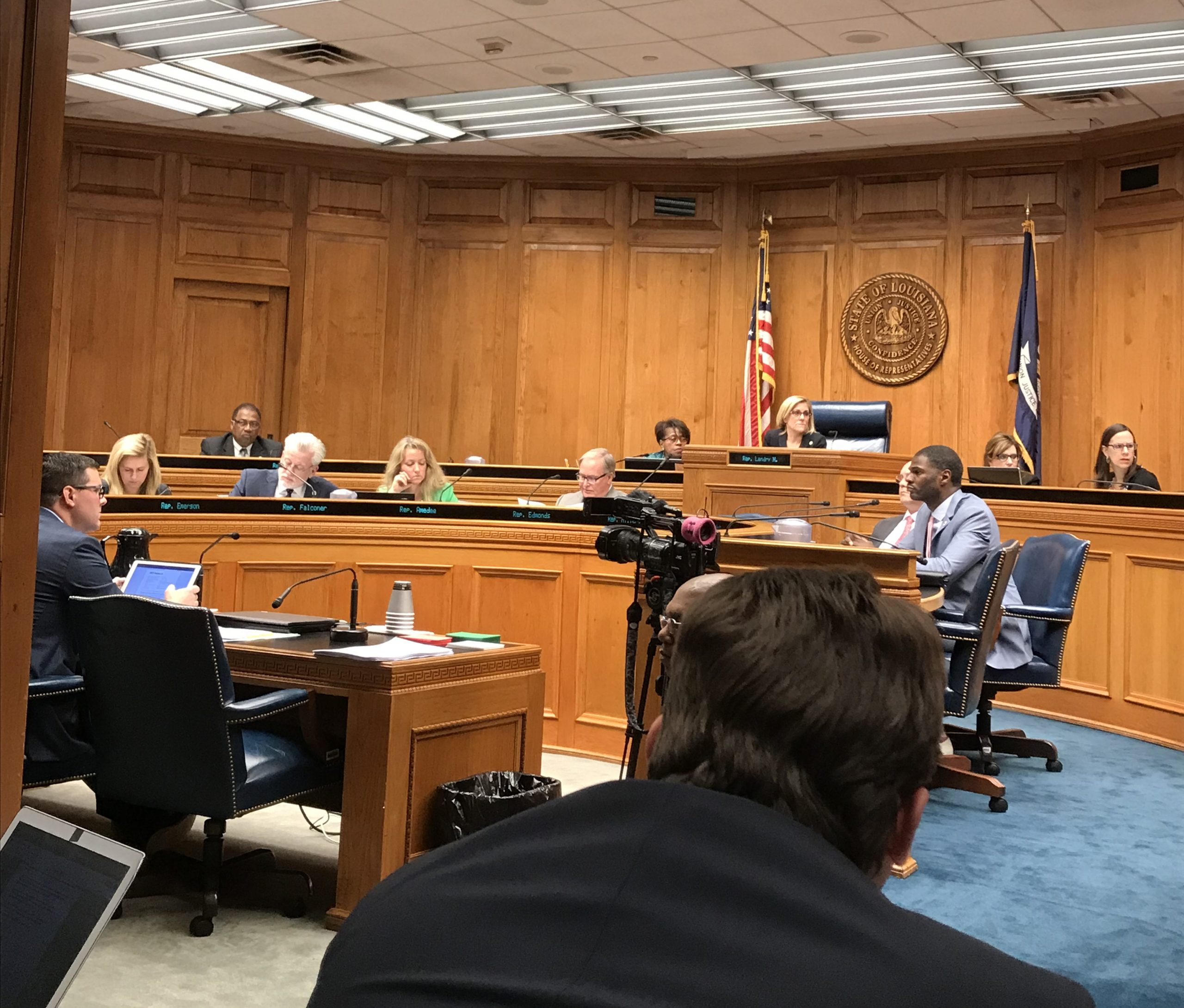By Joby Richard, LSU Manship School News Service
BATON ROUGE—A divided House committee on Thursday approved three bills that would tighten eligibility for the popular TOPS scholarships and require some recipients to first attend two-year colleges.
One bill, by Rep. Barry Ivey, R-Central, would create a new scholarship tier that would channel students into community and technical colleges before allowing them to transfer to four-year universities. The House Education Committee passed the bill 7-6, with seven of the eight Republicans voting yes and all five Democrats voting no.
A second Ivey bill that would increase the grade requirements for university students to maintain entry-level TOPS awards passed 8-5.
The third bill, sponsored by Rep. Ray Garofalo, R-Chalmette, would require students who become ineligible academically to repay their TOPS awards. It also passed 8-5.
The bills will go next to the House floor, where they are likely to receive tougher scrutiny.
While Gov. John Bel Edwards has said that funding for the $290 million TOPS program could be slashed if the Legislature does not find more revenue, he and Senate leaders have shown little interest in making adjustments in how the program works.
Ivey’s bill to create a new tier, the TOPS Transfer Award, for students who start out at two-year colleges would take effect for seniors graduating from high school in 2022. Ivey originally brought this bill in 2016, but it failed on the House floor.
Ivey said he was seeking slower pacing and more remediation opportunities for students lacking academic maturity. He acknowledged his own personal struggles in adjusting to university life and losing TOPS in his first semester at LSU.
Rep. Ken Brass, D-Vacherie, expressed concern that this bill might disportionately impact minority and low-income students who barely meet the ACT threshold to attend universities.
Brass said that raising the bar impacts students who may not be focused in ninth or tenth grade, but may gain college focus later in their school years.
If this bill affected current TOPS recipients, said Sujuan Boutte, executive director of Louisiana Office of Student Financial Assistance, it would channel 5,204 students, or 10.2 percent of TOPS recipients, into community colleges.
Dr. James Caillier, Executive Director of the Patrick Taylor Foundation, voiced concern that the committee was tampering with a program that is already working. Caillier said that in a national study released on Wednesday, Louisiana, Michigan, North Dakota and Tennessee were ranked as the states with the best merit-based scholarship programs.
“Why would we force students into a two-year school, when nationally, we see they are prepared to attend four-year universities?” Caillier said.
Callier, a former Delgado Community College president, said most core university classes do transfer from community colleges to universities. Students, however, generally lose 20 percent to 25 percent of their credits in their major areas when they transfer institutions.
Rep. Stephen Carter, R-Baton Rouge, was the lone Republican to vote against Ivey’s bill. He asked Caillier for the Southern Regional Education Board’s national graduation rate statistic, which is that 57 percent to 58 percent of students graduate within six years.
Meanwhile, Louisiana’s graduation rate teeters around 40 percent. Caillier says this is due to non-TOPS students who are attend universities. “Ivey’s bill targets the wrong group,” said Caillier.
Caillier explained that there are unique advantages for students at either a two- or four-year school. “Students should keep the option to choose their school, and not be forced into two-year schools by legislation,” he said.
Ivey also would raise the grade point average requirements for students to maintain the current entry-level award, known as the TOPS Opportunity Award.
The bill would raise the minimum annual G.P.A. from 2.3 to 2.5 for all 24 credit hours taken in the freshman year. For the rest of their years in college, the GPA minimum would be 2.75.
This new rules apply to incoming college freshman in the 2018-19 school year.
Boutte said 48% of all award recipients now receive the TOPS Opportunity Award, which requires only a 20 out a possible 36 overall score on the ACT exam and a 2.5 high school G.P.A.
TOPS now has two higher-award categories. TOPS Performance Award recipients account for 26% of TOPS recipients, and TOPS Honors accounts for 23%. Boutte pointed out that these students are currently required to maintain 3.0 GPAs in college to maintain their TOPS awards and will experience no change under this bill.
Ivey said if the state asks taxpayers to pay more for students to go to college, then it would be justified in raising performance requirements to make students to work a little harder.
Although the bill would not affect current TOPS recipients, Will Brewer from the Legislative Fiscal Office provided statistics on who would be impacted.
As of fiscal year 2017, 525 TOPS recipients currently have a 2.3 GPA, but not a 2.5. 2,067 students maintained a 2.5 GPA in college, but not a 2.75.
Rep. Patricia Smith, D—Baton Rouge, also pointed out this increased performance standard would impacts minority and low-income students.
Mr. Caillier emphasized that students do not need a 2.75 to graduate from college. At minimum, students are already required to maintain a 2.0 to maintain in good standing at most four-year universities.
Rep. Garofalo’s bill would require 2017-18 high school graduates to repay all their TOPS awards if they failed to meet the requirements for maintaining eligibility or resigned from college.
Garofalo said he wanted students to think seriously before accepting a TOPS award.
The Legislative Fiscal Office projects that by 2020, the recoupment could raise up to $7.7 million, and by 2024, up to $32.9 million. Garofalo said that was not his main motivation, but would be “just the icing on the cake.”
Caillier, who was around when the TOPS program was created in the early 1990s, said award repayment was discussed back then to penalize students who abused their awards. The TOPS program, however, already has a penalty. Students permanently lose their award if they do not maintain annual GPA requirements.

